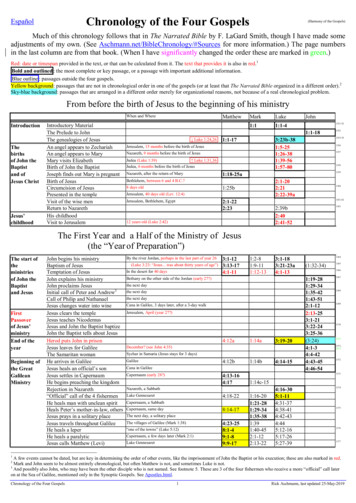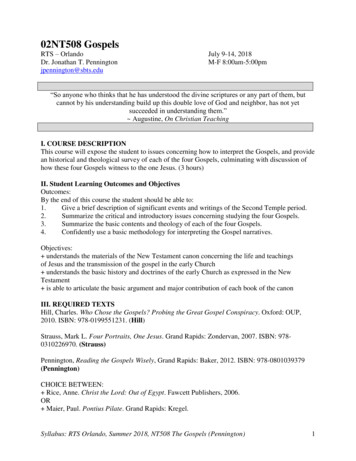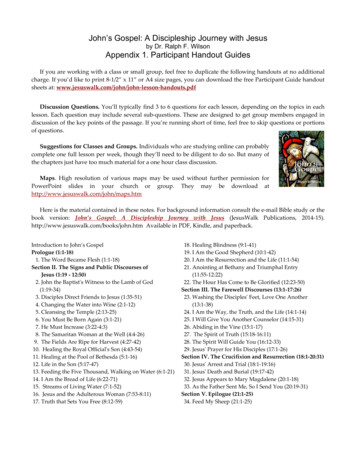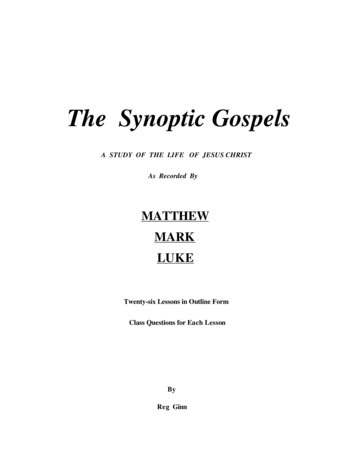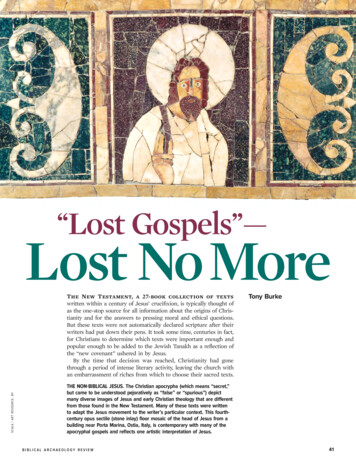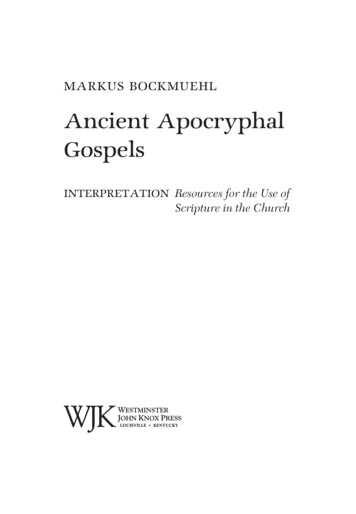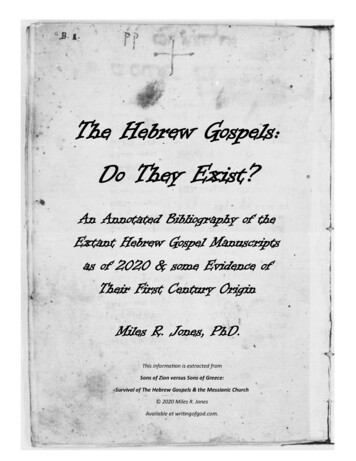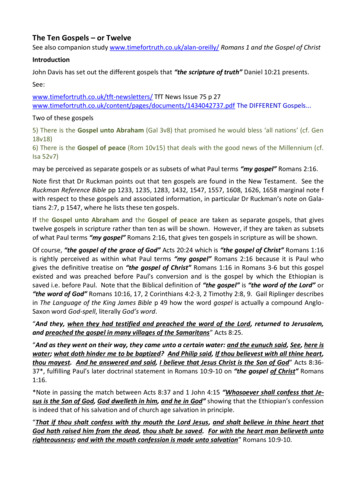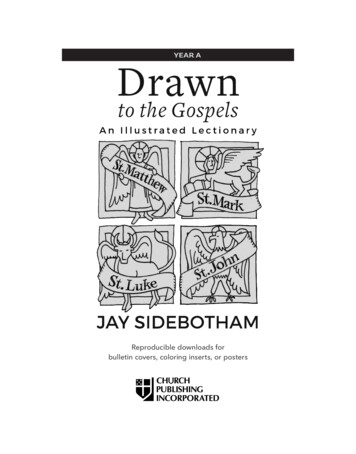
Transcription
Feasting on the GospelsMark
Editorial BoardGENERAL EDITORSCynthia A. Jarvis (Presbyterian Church (U.S.A.)), Minister, The PresbyterianChurch of Chestnut Hill, Philadelphia, PennsylvaniaE. Elizabeth Johnson (Presbyterian Church (U.S.A.)), J. Davison Philips Professorof New Testament, Columbia Theological Seminary, Decatur, GeorgiaVOLUME EDITORSChristine Chakoian (Presbyterian Church (U.S.A.)), Pastor, First PresbyterianChurch of Lake Forest, Lake Forest, IllinoisGary W. Charles (Presbyterian Church (U.S.A.)), Pastor, Central PresbyterianChurch, Atlanta, GeorgiaJaime Clark-Soles (American Baptist Churches USA), Associate Professor of NewTestament, Perkins School of Theology, Dallas, TexasStephanie Buckhanon Crowder (National Baptist Convention, Christian Church[Disciples of Christ]), Adjunct Faculty, New Testament Studies, McCormickTheological Seminary, Chicago, IllinoisR. Alan Culpepper (Baptist [Cooperative Baptist Fellowship]), Dean and Professorof New Testament, McAfee School of Theology, Mercer University, Atlanta,GeorgiaMark Douglas (Presbyterian Church (U.S.A.)), Professor of Christian Ethics andDirector, Master of Arts in Theological Studies Program, Columbia TheologicalSeminary, Decatur, GeorgiaMary F. Foskett (Baptist [Cooperative Baptist Fellowship]), Professor of Religionand Director of WFU Humanities Institute, Wake Forest University, WinstonSalem, North CarolinaMartha Moore-Keish (Presbyterian Church (U.S.A.)), Associate Professor ofTheology, Columbia Theological Seminary, Decatur, GeorgiaD. Cameron Murchison (Presbyterian Church (U.S.A.)), Professor Emeritus ofMinistry, Columbia Theological Seminary, Decatur, GeorgiaCarmen Nanko-Fernández (Roman Catholic Church), Associate Professor ofHispanic Theology and Ministry, Catholic Theological Union, Chicago, IllinoisStanley P. Saunders (Christian Church [Disciples of Christ]), Associate Professorof New Testament, Columbia Theological Seminary, Decatur, GeorgiaRichard F. Ward (United Church of Christ), Fred B. Craddock Professor ofHomiletics and Worship, Phillips Theological Seminary, Tulsa, OklahomaCONSULTING EDITORSDavid L. Bartlett (American Baptist Churches USA), Professor Emeritus of NewTestament, Columbia Theological Seminary, Decatur, GeorgiaBarbara Brown Taylor (The Episcopal Church), Butman Professor of Religion,Piedmont College, Demorest, GeorgiaPROJECT MANAGERJoan Murchison, Columbia Theological Seminary, Decatur, GeorgiaPROJECT COMPILERMary Lynn Darden, Columbia Theological Seminary, Decatur, Georgia
A Feasting on the Word Commentary Feasting on the GospelsMarkCYNTHIA A. JARVIS and E. ELIZABETH JOHNSONGeneral Editors
2014 Westminster John Knox Press2014 paperback editionOriginally published in hardback in the United Statesby Westminster John Knox Press in 2014Louisville, Kentucky14 15 16 17 18 19 20 21 22 23—10 9 8 7 6 5 4 3 2 1All rights reserved. No part of this book may be reproduced or transmitted in any form or by any means, electronic ormechanical, including photocopying, recording, or by any information storage or retrieval system, without permission inwriting from the publisher. For information, address Westminster John Knox Press, 100 Witherspoon Street, Louisville,Kentucky 40202-1396. Or contact us online at www.wjkbooks.com.Scripture quotations from the New Revised Standard Version of the Bible are copyright 1989 by the Division of ChristianEducation of the National Council of the Churches of Christ in the U.S.A. and are used by permission. Scripture quotationsmarked NASB are taken from the New American Standard Bible, 1960, 1962, 1963, 1968, 1971, 1972, 1973, 1975, 1977 byThe Lockman Foundation. Used by permission. Scripture quotations marked NIV are from The Holy Bible, New InternationalVersion. Copyright 1973, 1978, 1984 International Bible Society. Used by permission of Zondervan Bible Publishers. Scripture quotations marked RSV are from the Revised Standard Version of the Bible, copyright 1946, 1952, 1971, and 1973 by theDivision of Christian Education of the National Council of the Churches of Christ in the U.S.A., and are used by permission.Excerpt from Huub Oosterhuis, “He Did Not Want to Be Far,” TheWorshipbook (Philadelphia: The Westminster Press, 1975) isreprinted by permission of the WCC Publications.Excerpt from “If Christ Is Charged with Madness,” by Thomas Troeger Oxford University Press Inc. 1986. Assigned toOxford University Press 2010. Reproduced by permission. All rights reserved.Excerpt from “Silence! Frenzied, Unclean Spirit,” by Thomas Troeger Oxford University Press Inc. 1986. Assigned to OxfordUniversity Press 2010. Reproduced by permission. All rights reserved.Book design by Drew StevensCover design by Lisa Buckley and Dilu NicholasLibrary of Congress Cataloging-in-Publication DataFeasting on the Gospels : a feasting on the WordTM commentary / Cynthia A. Jarvis and E. Elizabeth Johnson, generaleditors. — First edition.volumes cmIncludes index.ISBN 978-0-664-23162-0 (v. 3: hardback)ISBN 978-0-664-23394-5 (v. 2: hardback)ISBN 978-0-664-23540-6 (v. 1: hardback)1. Bible. Matthew—Commentaries. I. Jarvis, Cynthia A., editor of compilation.BS2575.52.F37 2013226'.2077—dc232013004484ISBN 978-0-664-25991-4 (v. 3 paperback)ISBN 978-0-664-23974-9 (v. 2 paperback)ISBN 978-0-664-23973-2 (v. 1 paperback)The paper used in this publication meets the minimum requirements of the American National Standardfor Information Sciences—Permanence of Paper for Printed Library Materials, ANSI Z39.48-1992.
ContentsviiPublisher’s NoteixSeries 2218224230236Mark 1:1–8Mark 1:9–11Mark 1:12–13Mark 1:14–15Mark 1:16–20Mark 1:21–28Mark 1:29–34Mark 1:35–39Mark 1:40–45Mark 2:1–12Mark 2:13–17Mark 2:18–22Mark 2:23–28Mark 3:1–6Mark 3:7–12Mark 3:13–19aMark 3:19b–30Mark 3:31–35Mark 4:1–9Mark 4:10–20Mark 4:21–25Mark 4:26–29Mark 4:30–34Mark 4:35–41Mark 5:1–20Mark 5:21–24a, 35–43Mark 5:24b–34Mark 6:1–6aMark 6:6b–13Mark 6:14–29Mark 6:30–44Mark 6:45–52Mark 6:53–56Mark 7:1–23Mark 7:24–30Mark 7:31–37Mark 8:1–10Mark 8:11–21Mark 8:22–26Mark 22428434440446452458464470476482488494500506Mark 8:31–33Mark 8:34–9:1Mark 9:2–8Mark 9:9–13Mark 9:14–29Mark 9:30–32Mark 9:33–37Mark 9:38–41Mark 9:42–50Mark 10:1–12Mark 10:13–16Mark 10:17–22Mark 10:23–31Mark 10:32–34Mark 10:35–45Mark 10:46–52Mark 11:1–10Mark 11:11–26Mark 11:27–33Mark 12:1–12Mark 12:13–17Mark 12:18–27Mark 12:28–34Mark 12:35–37Mark 12:38–40Mark 12:41–44Mark 13:1–8Mark 13:9–13Mark 13:14–23Mark 13:24–27Mark 13:28–31Mark 13:32–37Mark 14:1–2, 10–11Mark 14:3–9Mark 14:12–16Mark 14:17–21Mark 14:22–25Mark 14:26–31Mark 14:32–42Mark 14:43–52Mark 14:53–65Mark 14:66–72Mark 15:1–5Mark 15:6–15Mark 15:16–20
512518524530536Mark 15:21–32Mark 15:33–41Mark 15:42–47Mark 16:1–8Mark 16:9–20543Contributors549Author IndexviContents
Publisher’s NoteFeasting on the Gospels is a seven-volume series thatfollows in the proud tradition of Feasting on theWord: Preaching the Revised Common Lectionary.Whereas Feasting on the Word provided commentaryon only the texts in the lectionary, Feasting onthe Gospels will cover every passage of the fourGospels. Feasting on the Gospels retains the popularapproach of Feasting on the Word by providing fourperspectives on each passage—theological, pastoral,exegetical, and homiletical—to stimulate and inspirepreaching, teaching, and discipleship.Westminster John Knox Press is grateful to themembers of the large Feasting family who havegiven so much of themselves to bring this newseries to life. General editors Cynthia A. Jarvis andE. Elizabeth Johnson stepped from their service onthe editorial board of Feasting on the Word to theeditorship of Feasting on the Gospels without missinga beat. Their commitment, energy, and unflaggingenthusiasm made this work possible. The projectmanager, Joan Murchison, and project compiler,Mary Lynn Darden, continued their remarkablework, bringing thousands of pieces and hundreds ofauthors together seamlessly.The editorial board did enormous work undergrueling deadlines and did it with excellenceand good humor. The hundreds of writers whoparticipated—scholars, preachers, and teachers—gave much of themselves to help create this bountifulfeast. David Bartlett and Barbara Brown Taylor tookthe time and care to help conceive this new projecteven as they were finishing their excellent work asgeneral editors of Feasting on the Word.Finally, we are again indebted to ColumbiaTheological Seminary for their partnership. As theydid with Feasting on the Word, they provided manyresources and personnel to help make this seriespossible. We are grateful in particular to seminaryPresident Stephen Hayner and Dean of Faculty andExecutive Vice President Deborah Mullen.It is with joy that we welcome you to this feast,in hopes that it will nourish you as you proclaim theWord to all of God’s people.Westminster John Knox Pressvii
Series IntroductionAt their best, people who write about Scriptureare conversation partners. They enter the dialoguebetween the biblical text and the preacher orteacher or interested Christian and add perspectivesgained from experience and disciplined attention.They contribute literary, historical, linguistic, andtheological insights gathered over the millenniato the reader’s first impressions of what is goingon in a text. This conversation is essential if thereading of Scripture is to be fruitful in the church.It keeps reading the Bible from being an exercise inindividual projection or uncritical assumption. Thatsaid, people who comment on the Bible should neverbecome authorities. While a writer may indeed knowmore about the text than the reader does, he or shenevertheless writes from a particular perspectiveshaped by culture, ethnicity, gender, education, andtheological tradition. In this regard, the writer ofa commentary is no different from the writers andreaders of Scripture.The model for this series on the Gospels is thelectionary-based resource Feasting on the Word(Westminster John Knox Press, 2008–2011), nowwidely used by ministers as they prepare to preach.As central as the task of preaching is to the healthof congregations, Scripture is the Word that callsthe whole community of faith into being and sendsout those addressed as witnesses to the Word inthe world. Whether read devotionally by thosegathered to pray or critically by others gathered tostudy, the Bible functions in a myriad of ways toundergird, support, and nurture the Christian life ofindividuals and communities. Those are the reasonsthat Westminster John Knox Press has taken the nextstep in the Feasting project to offer Feasting on theGospels, a series in the style of Feasting on the Wordwith two major differences. First, all four Gospelsare considered in their entirety, a lectio continua ofsorts that leaves nothing out. Second, while Feastingon the Word is addressed specifically to preachers,Feasting on the Gospels is addressed to all who wantto deepen their understanding of the Gospels—Biblestudy leaders and class members, seasoned preachersand seminarians, believers and skeptics.The advantage of Feasting on the Gospels is thatthe reader encounters multiple perspectives on eachtext—not only the theological, exegetical, pastoral,and homiletical emphases that shape the essays,but also the ecumenical, social, ethnic, and culturalperspectives of the authors. Unlike a single-authorcommentary, which sustains a particular view of agiven interpreter throughout, Feasting on the Gospelsoffers readers a broad conversation that engagesthe text from many angles. In a church as diverse asthe twenty-first-century church is, such deliberateengagement with many voices is imperative and, wehope, provocative.A few observations about the particularchallenges posed by the Gospels are in order here.The Gospels were written in a time when fledglingChristian communities—probably in their secondgeneration—were just beginning to negotiatetheir relationships with Judaism (within whichthey were conceived and born), a community thatwas itself in the process of redefinition after thedestruction of the Second Temple in 70 CE. Someof that negotiation was marked by great tensionand sometimes outright hostility. The temptationfor Christian readers to read anti-Semitism intotexts that portray intra-Jewish conflict has besetthe church almost from its beginnings. Our editorshave been particularly mindful of this when dealingwith essays on texts where the temptation to speakcontemptuously of Jews and Judaism might threatenfaithful interpretation.A second observation involves the New Testamentmanuscript tradition. In Feasting on the Gospels weidentify and comment on significant manuscriptvariants such as Mark 16:9–20 and John 7:53–8:11,something we did not have to contend with inFeasting on the Word. We identify those variantreadings the way the NRSV does, except that we talkabout “other ancient manuscripts” rather than the“other ancient authorities” of the NRSV notes.The twelve members of our editorial board comefrom a broad swath of American Christianity: theyare members or ministers of Presbyterian, Baptist,United Church of Christ, Roman Catholic, andDisciples of Christ churches. Some of them areacademics who serve on the faculties of theologicalschools; others are clergy serving congregations. Allof them are extraordinarily hardworking, thoughtful,ix
and perceptive readers of Scripture, of the church,and of the world. The writers whose work comprisesthese volumes represent an even wider cross sectionof the church, most of them from North America,but a significant number from around the world,particularly the global South.We could not have undertaken this workwithout the imagination, advice, and support ofDavid Dobson, Editorial Director at WestminsterJohn Knox Press, and his colleagues Don McKim,Marianne Blickenstaff, Michele Blum, and JulieTonini. We are deeply grateful to David L. Bartlettand Barbara Brown Taylor, our mentors in theFeasting on the Word project, who continued tooffer hands-on assistance with Feasting on theGospels. We thank President Stephen A. Haynerxand Dean Deborah F. Mullen of ColumbiaTheological Seminary and the congregation of ThePresbyterian Church of Chestnut Hill in Philadelphia,Pennsylvania, who made possible our participation inthe project. Joan Murchison, who as Project Managerkept all of us and our thousands of essays in orderand enforced deadlines with great good humor, isonce again the beloved Hammer. Mary Lynn Darden,our compiler, who corralled not only the essays butalso information about their authors and editors,brought all the bits and pieces together into the booksyou see now.To the preachers, teachers, Bible study leaders,and church members who will read the Gospels withus, we wish you happy feasting.Series IntroductionCynthia A. JarvisE. Elizabeth Johnson
Feasting on the GospelsMark
Mark 1:1–81The beginning of the good news of Jesus Christ, the Son of God.it is written in the prophet Isaiah,“See, I am sending my messenger ahead of you,who will prepare your way;3 the voice of one crying in the wilderness:‘Prepare the way of the Lord,make his paths straight,’”4John the baptizer appeared in the wilderness, proclaiming a baptism of repentance for the forgiveness of sins. 5And people from the whole Judean country 2AsTheological PerspectivePastoral PerspectiveMost stories in the Bible begin with a humanbeing—Abram and Sarai, Naomi and Ruth, Jamesand John. Yes, there are exceptions—the creationstory most especially. Two of the four Gospels beginfrom the human side—with a genealogy in Matthew,and Zechariah and Elizabeth in Luke. Even John,which begins with the creation through the Word,includes “all people” in the opening verses of itsPrologue (John 1:4). Mark simply begins with “thebeginning of the good news of Jesus Christ, the Sonof God” (v. 1). Yes, Jesus is human as well as divine,but the human side of Jesus’ advent (his birth, hischildhood, his call) gets no space in Mark.Mark is the story of an invasion, an invasion ofthis world by God and God’s reign. Most humaninvasions involve some preparation—planning outthe route, softening up the resistance, spreadingsome propaganda regarding the invaders. In somevery basic way, John the Baptist serves this purpose.However, in Mark, even John’s work seems perfunctory, and rushed, and orchestrated somewhereoffstage (“John the baptizer appeared in the wilderness,” v. 4). This is an invasion that is going forwardwithout any invitation. This is an invasion that neither expects nor requires any real receptivity on thepart of those for whom the invasion is planned (asthe whole Gospel will make clear; nobody “gets” it,The Gospel according to Mark begins with one of thefinest opening lines in biblical literature. This grandsentence introduces the story of Jesus as good news.Today there is a heart hunger for good news.One unofficial means of documenting this hunger isthrough church prayer chains. Nearly every congregation has one, and it is almost always fully occupiedwith the concerns of parishioners, their family members, and friends. Meanwhile, every congregationis full of concerns that never make it to the prayerchain because people keep their thoughts stored intheir hearts until they utter them to God. Someonehas cancer. Another is looking for work. Here a heartis heavy with grief, and a dreadful worry weighsupon another soul. There is no end to the list of concerns. Tennyson’s line still obtains: “Never morningwore / To evening, but some heart did break.”1 Thepastoral task is to speak to these broken hearts, offering the strength and help to be found in God’s goodnews in Jesus Christ.Today there is a particular hunger for goodnews from religion. Religion has become associatedwith bad news, harsh attitudes, and caustic spirits.The treatment of women, of children, of gays and21. In Memoriam A.H.H., 6, lines 7–8, in Tennyson’s Poetry, ed. Robert W. Hill,2nd ed. (New York: W. W. Norton, 1999), 209.Feasting on the Gospels
side and all the people of Jerusalem were going out to him, and were baptizedby him in the river Jordan, confessing their sins. 6Now John was clothed withcamel’s hair, with a leather belt around his waist, and he ate locusts and wildhoney. 7He proclaimed, “The one who is more powerful than I is coming afterme; I am not worthy to stoop down and untie the thong of his sandals. 8I havebaptized you with water; but he will baptize you with the Holy Spirit.”Exegetical PerspectiveHomiletical PerspectiveMark’s introduction to his narrative anchors thechurch’s gospel in continuity with Jesus, Scripture,and John the Baptist.With its collection of powerful, world-changingstories, Mark’s Gospel provides rich fodder forthe preacher. Even the very first line offers fertilematerial: “The beginning of the good news of JesusChrist, Son of God.” Most scholars understand thisbrief sentence to be a title summarizing Mark’s purpose for writing the book, to tell the story of God’s“good news” made present in the advent of JesusChrist. Unlike the later Gospel writers, Mark doesnot say he intends to give a full and final account ofthings. In fact, most scholars believe that Mark doesnot offer a conventional conclusion to his narrative,where things are wrapped up neatly, as we find in theother Gospels. Instead, his Gospel actually ends in16:8 with an empty tomb.The unfinished nature of his testimony, juxtaposed to this strong, affirmative opening statement,suggests that for Mark, the life, ministry, death, andeven the resurrection of Jesus Christ are not the endof the story. They are, instead, the events that set thegospel in motion. The “good news” story of JesusChrist, Son of God, is an ongoing one, continuinginto the story of the church’s birth and expansion,and into the lives of those who meet the living Christtoday.Most of the time, however, modern Christiansexperience the story of Jesus as ancient history, farThe Church’s Gospel Is in Continuity with Jesus(v. 1). The discussion here presented understands 1:1to be Mark’s title for his narrative as a whole (as inthe NRSV). The word “gospel” (euangelion), “goodnews,” refers to the church’s message of God’s savingact in Jesus, the message proclaimed by the church ofMark’s day and ours. It does not here refer to a bookrepresenting the life and teaching of Jesus, a meaningthe word did not attain until the middle of the second century. Thus Mark 1:1 does not mean “the Gospel begins here” (a gratuitous comment in any case).Mark’s first word, archē, can mean “beginning,source, and/or norm.” English has no single word withall three connotations; here it has overtones of all threeEnglish words. There were many versions of the Christian message in Mark’s day, as in ours. Not all wereequally valid, and some were dangerously perverse.The author wants to provide direction for how thegospel can be authentically proclaimed. He does thisnot by stating a creed or list of principles to which theChristian message should conform, but by claimingthat the narrative to follow is the beginning, source,and norm for the church’s proclamation of the gospel.Mark : – 3
Mark : – Theological PerspectivePastoral Perspectivewith the exception of the demons and the centurion,15:39). This is an invasion that only begins in the life,death, and resurrection of Jesus Christ (the last ofwhich gets almost no coverage in Mark), because itis an invasion that is still going on.To say that the Gospel of Mark emphasizes God’sinitiative in salvation is a gross understatement. Thisis not a story of a people crying out and God coming down (as in Exodus). This is not a story of Godinfiltrating the world through the righteousness ofJoseph (Matthew) or the obedience of Mary (Luke).No, this is the story of a God who will bring in hisreign, come hell or high water. Ready or not, hereGod comes!One way to think about this is to focus on Mark’shearers, a mostly Gentile community of believersunder persecution in the 70s CE. They would prefera Messiah who would appreciate their willingness towork with him toward the overthrow of the empirethat has them in its grip. He could nurture a groupof dedicated disciples, train them in the disciplinesrequired for his service, then lead them on to victory.“The beginning of the good news of Jesus Christ, theSon of God, and his faithful minions.” However, thisGospel ends with the death of a suffering Messiah,and the women running away in fear. Take that, yourevolutionary zealots!Another, and perhaps more productive, way tothink about this is in relationship to us. It is not justthat we would prefer a victorious Messiah to a suffering Messiah. That is relatively easy to swallow. Whatis a tad more difficult to accept and give thanks for isa God who is coming regardless. No asking or preparing or cooperation on our part at all. You call that“good news”?Yes, by all means, yes. Is that not what this beginning, theologically, is all about?This then would be a good occasion to reviewsome basic theology, like “prevenient grace.” Wethank God not only for coming to us, but for preparing our receptivity to God’s approach, no thanks tous. “This effectual call is of God’s free and specialgrace alone, not from anything at all foreseen inman, who is altogether passive therein, until, beingquickened by the Holy Spirit, he is thereby enabledto answer this call, and to embrace the grace offeredand conveyed in it.”1 Yes, this is an invasion.This would be a good occasion to think a little,theologically, about how we share this news withlesbians, of different races, and even of visitors toour church pews has led to the idea that religion,not only Christianity, is something that comes downhard on people. The more negatively religion is perceived, the less appealing the life of faith appears. Wehave before us a golden opportunity and responsibility to do what Mark did for the world, when heopened his book the way he did. We can present theChristian message as good news.Today there is a heart hunger for good newsrooted in something historic. Many of us modernssuffer from a kind of tyranny of the latest. Underthis tyranny we tend to think the times in which welive are unprecedented in terms of their difficultyand complexity. David McCullough had this tyrannyin mind when he wrote 1776. His book about thatcrucial year in American history was his response tothe terrorist attacks of September 11, 2001. Withoutdenying the severity of those attacks or their impactupon the nation, he reacted against those who statedthat our country had never before faced an ordealthat severe. McCullough wrote 1776 to say we hadfaced such a time before and had survived.2Some such word can be helpful today. Think onlyof issues facing the church. There is no question thatlife in twenty-first-century North America posesstrong challenges to the church. A people faced withthese difficulties can think them unprecedented, andso strong that congregations have impossible oddsagainst them.Pastoral help can come from digging down intohistory, particularly in Scripture, to discover theresources to be found there. Mark anchors the storyhe is about to tell in the Scriptures, particularly inthe prophets. The material from Isaiah was morethan six hundred years old when Mark put it to use.He realized he was writing for the present, but hedrew upon the past. Like Mark we can find yesterdayfull of profound help for today. Stability can comewhen we see that the faith we profess has seen people through all manner of circumstances, and thereis no reason to believe it will be undone by thosethat we face.Moving to something more specific than the general need for good news, think about the present-dayneed for a word about guilt. John the Baptist’s message and work turned people toward the forgivenessof sin. People flocked into the wilderness to hearhim. Even taking the hyperbole of Mark 1:5 (“all the1. The Westminster Confession of Faith (6.065), in The Constitution of thePresbyterian Church (U.S.A.), Part 1, Book of Confessions (Louisville, KY: Officeof the General Assembly, 2002), 134.2. Justin Ravitz, “Author Interview: David McCullough,” www.bomc.com.May 21, 2005.4Feasting on the Gospels
Exegetical PerspectiveHomiletical PerspectiveThe church does not merely continue the message of Jesus, but proclaims its faith that, in Jesus,God has acted definitively to reveal and make realGod’s own character and saving action. The churchdoes not replicate Jesus’ own message. In the light ofEaster, the church proclaims God’s saving act in theChrist event, but can do this legitimately only if thechurch’s message is inseparably bound to the story ofthe crucified and risen Jesus.removed from our own. They may acknowledge itto be their most essential identity-shaping story,offering powerful insights into who God is and whowe are in relation to God. That said, do they or wefully comprehend the implications of a story whosecentral figure, Jesus, is not simply a historical rolemodel, but is instead the risen and living Lord?What could it mean for congregations to believethat we, here today, are part of this ongoing storyof good news, that the end of the story has not yetbeen written? Can we imagine ourselves as playersin God’s drama of redemption? What role might wediscover God calling us to assume in God’s unfinished story of grace and reconciliation and love?Where might we discover we have failed to take upthat responsibility? Most importantly, where do wesee Jesus, the “good news” made flesh, inviting us tojoin him in the ongoing work of reconciliation in thelife of our world today?In this first sentence, Mark uses language thatechoes that of the creation stories. “In the beginning,” says Genesis, God created all that is, on earthand in the heavens. Here Mark declares another“beginning,” a new creation—the beginning of the“good news.” In Mark’s day, followers of the still-newChristian faith were experiencing significant persecution at the hands of the Roman Empire. The Greekword Mark uses for this new thing that is happeningbecause of the coming of Jesus is euangelion, “gospel.” This term was often used in his time to refer tothe peace, prosperity, and good life that came from agrand military victory by the empire.It is a bold move for Mark to dare to suggest thatit is the Son of God, Jesus Christ, rather than Caesar, who makes this hope- and peace-filled kind ofnew life possible. In our present day, where militaryventures across the world have produced hollow victories at best, it is a good reminder for us as well thatour true security and redemption come from thehands of God and not from human might. Moreover,in a time when there is a plethora of bad news, wehear from Mark the life-giving good news that all isnot finished, that God is still in the process of making all things new.Mark’s story of good news begins with a lookback to the prophets. “As it is written in the prophetIsaiah, ‘See, I am sending my messenger ahead ofyou, who will prepare your way’” (v. 2). In this newbeginning, God’s long-standing promises are beingfulfilled. These very first words connect the newstory of Jesus, which was foretold by the prophets ofold, with the ongoing story of God. The messengerThe Church’s Gospel Is in Continuity with theScripture (vv. 2–3). In Mark, Jesus appears on thestage of history for the first time in 1:9, when hecomes to be baptized by John. Prior to any actionon the narrative stage, the audience hears an offstage, transcendent voice speaking in the words ofScripture (actually a mélange of three different texts[Exod. 23:20; Mal. 3:1; Isa. 40:3]). Mark claims, asdoes the New Testament in general, that the plan ofGod revealed in the Jewish Scriptures finds its goaland fulfillment in the event of Jesus Christ. Mark isdistinctive in presenting these Scripture t
vii Publisher's Note Feasting on the Gospels is a seven-volume series that follows in the proud tradition of Feasting on the Word: Preaching the Revised Common Lectionary. Whereas Feasting on the Word provided commentary on only the texts in the lectionary, Feasting on the Gospels will cover every passage of the four Gospels.

